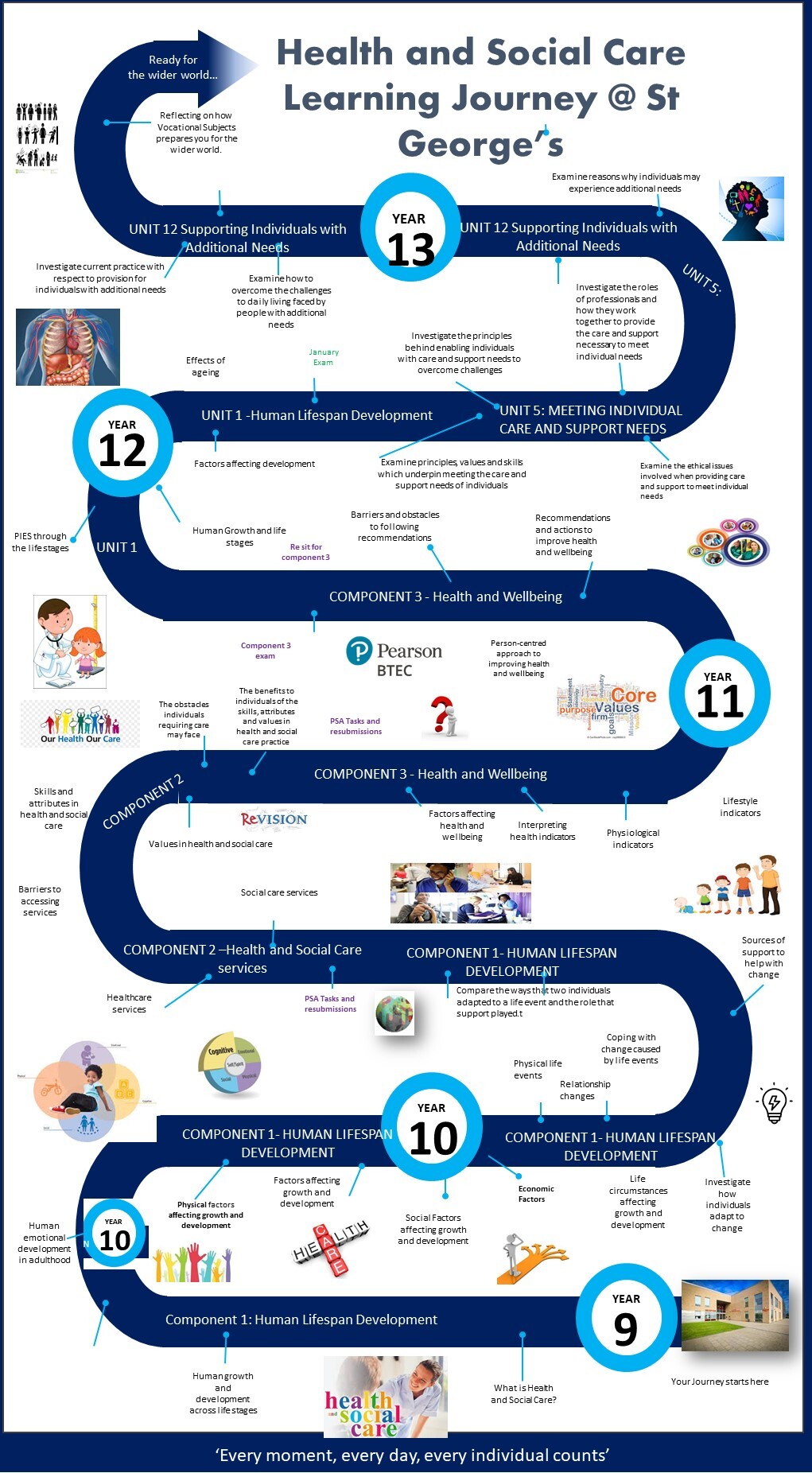Health and Social Care (Level 2 and 3 BTEC)
Subject Vision
HSC is a subject that students can study at both Key Stage 4 and 5.
Adventurous – Students will cover everything from jobs in the Health and Social Care sector, skills that are needed to be a good service provider. Laws, policies and procedures that must be followed, All the while we are aiming to create a learning environment that allows students to explore topics while providing stimulating activities to meet a well-balanced development of knowledge and understanding
Curiosity – Should the NHS make fertility available to everyone? Should someone in later adulthood have to pay for their own care? Which policies are the best at reducing misconduct in health? Students have the opportunity to consider questions like these alongside many other important issues that occur in Health and Social Care that evoke their curiosity of the wider world and ensure they are eager to learn and be inquisitive
Independence – Students learn how to research different topics, with the use of lessons and case studies, to be able to apply their understanding and new-found knowledge and develop presentations on the subject that help ingrain, retain and model their new-found freedom of information.
Community –. We look at a range of care settings from hospitals and care homes to day centers and nurseries. We have opportunities to go to some of these settings to gain first-hand knowledge, understanding and experience of the day-to-day running of a care setting. Guest speakers are regularly invited into school to share their knowledge and experiences with those who have a common characteristic or interest within a larger society.
Resilience – Students are encouraged to be inspired and changed by using case studies and scenarios that are relevant and relatable to their own lives and experiences and successfully adapting this information to difficult or challenging life experiences, especially through mental, emotional, and behavioral flexibility that they either have encountered them themselves or know someone that has.
Challenging – The course equips students with the knowledge and skills necessary for further study and work in the Health and Social Care sector by looking into key areas such as legislation changes, health and safety, barriers people face when accessing services, life events people face and the effect they have on a person’s development. When covering these areas students will have to use problem solving skills that test their ability which will develop their abstract and critical thinking. They will have to use communication and collaborative skills to work in and out of the classroom and be able to apply self-managements skills to become adaptable in a demanding environment.
Staff
Homework
For HSC year groups, homework as follows-
|
10A/2 10A/1 10B/1 10C/1 11A/1 11C/1 11A/2 |
Monday Monday Tuesday Thursday Wednesday Wednesday Wednesday |
Year 12 - set weekly for independent research
Year 13 -set weekly for independent learning and research.
For year 11, they can use the following sites -
Getrevising.co.uk
BBC Bitesize.
Cram.com for quizzes and flash cards.
Our Learning Journey

Level 2 Subject Information - KS4
BTEC Level 1/2 Tech Award
Students receive 3 lessons a week studying 3 components, component 1 and 2 are coursework and component 3 is assessed by an exam.
There are a number of skills developed through the study of Health and Social Care, some of which are specific to the nature of the subject and some of which are widely transferable. Specific skills include; to be able to make comparisons, to be able to analyse and to be able to draw upon personal and lived experiences. Transferable skills include; communication, to present ideas and arguments verbally, identify and propose solutions to problems, to work independently, use information technology and reflect on and review progress.
| Term 1 | Term 2 | Term 3 | Term 4 | Term 5 | Term 6 | |
|---|---|---|---|---|---|---|
| Year 9 | n/a | n/a | n/a | n/a | n/a | Component 1 Learning Aim - A |
| Year 10 |
Component 1 Learning Aim B Pearson Set Assignment Task |
Component 1 Pearson Set Assignment Task |
Component 2 Learning Aim A |
Component 2 Learning Aim B Pearson Set Assignment Task |
Component 3 Exam Prep |
Component 3 Exam Prep |
| Year 11 |
Component 3 Exam Prep |
Component 3 Exam Prep |
Component 3 Exam Prep |
Resit |
Resit |
n/a |
Level 3 Subject Information - KS5
BTEC Level 3 National
Students have 5 hours of Health and Social Care each week.
The subject prepares students for the world of work, access to university or the opportunity to join one of the main roles in the sector.
Students will be assessed via coursework which will be presented in the form of
- Powerpoints
- Word Documents
- Leaflets
- Posters
- Or group presentations
Students are assessed via coursework and exams.
| Term 1 | Term 2 | Term 3 | Term 4 | Term 5 | Term 6 | |
|---|---|---|---|---|---|---|
| Year 12 |
Unit 1 – Human Lifespan Development Exam Prep |
Unit 1 – Human Lifespan Development Exam Prep |
Unit 1 – Human Lifespan Development Exam Prep Unit 5 Individual Needs |
Unit 5 Individual Needs |
Unit 5 Individual Needs |
Unit 5 Individual Needs Resit of Unit 1 |
| Year 13 |
Unit 2 Working in HSC Exam Prep |
Unit 2 Working in HSC Exam Prep |
Unit 2 Working in HSC Exam Prep Unit 12- supporting individual with additional needs - LA A |
Unit 12- supporting individual with additional needs - LA B |
Unit 12- supporting individual with additional needs - LA C |
Resit of Exam |
Revision - BTEC Level 2 Tech Award (KS4)
General Information (Useful Information for Parents)
Students studying level 2 HSC will receive three timetabled lessons a week, in Year 10 and 11.
Component 1 and 2 are completed in Year 10
Component 3 in Year 11
In Year 11 pupils will spend the first two terms revising for their January exam. Students will have the opportunity to re sit this exam in the summer of Year 11.
| Personal Learning Checklist | Click Here - Component Three |
|---|---|
| Example Exam Questions/Model Answers | Exam Paper Mark scheme |
| Revision | (Pupils must log in with their username as their usual computer login followed by @st-georgescofe-thanet.kent.sch.uk (e.g. JSmith123@st-georgescofe-thanet.kent.sch.uk) and their usual password they use to log on to school laptops) |
| Revision Guides | BTEC Tech Award in Health & Social Care: Revision Guide (for courses starting in 2022) ISBN: 9781789089097 BTEC Tech Award in Health & Social Care: Exam Practice Workbook (for courses starting in 2022) ISBN: 9781789089073 |
Revision - BTEC Level 3 National (KS5)
General Information (Useful Information for Parents)
| Personal Learning Checklist |
Unit 1 - Click Here Unit 2 - Click Here |
|---|---|
| Example Exam Questions/Model Answers |
Unit 1 -
Unit 2 -
|
| Revision Materials / Sharepoint |
Past exam papers Power points are available on each topic
|
Career Progression in HSC
Career Opportunities in HSC after going to University:
- Health administration
- Care management
- Further Education teaching
- Community development
- Charity Officer
- Social work
- Nursing
- Health therapies
- Youth work.
Career opportunities after leaving School:
- Therapy assistant
- Medical technician
- Health care assistant
- Social Worker assistant
JOB OPPORTUNITIES
Health and social care can lead to careers such as:
Health visitors
What does a health visitor do?
Health visitors travel to people’s homes, especially new mothers and children, to provide information, practical care, and support to help clients cope with any difficulties they are experiencing. The role may involve working with a broad section of people in the community, and duties might often include:
- advising older people on health related issues
- giving advice to new mothers about their baby – for example hygiene, safety, feeding and sleeping
- counselling people on issues such as post-natal depression or bereavement
- coordinating child immunisation programmes
- organising special clinics or drop-in centres
Health visitors work closely with other agencies, such as social services and local housing departments.
What do I need to do to become a health visitor?
To become a health visitor, you will need to have the ability to relate to people of all ages and backgrounds. You must have excellent communication and listening skills. Sometimes you will need to be able to cope with distressing issues.
You will need to be a qualified midwife or nurse to begin an approved health visitor training programme and work as a health visitor. There is no minimum length of experience required, but you will need the ability to study at university level.
To start training, you would need to apply for the Specialist Community Public Health Nursing Health Visiting (SCPHN/HV) programme. The qualification is studied at degree level, or postgraduate level if you already have a degree
CARE WORKER
What does a care worker do?
Care workers or home carers work with people who have difficulties with every day activities. You may be helping children, people with physical or learning disabilities, and older people or families. Tasks can include:
- spending time getting to know clients and understanding their wishes and needs
- looking after clients, helping them wash, use the toilet, dress and eat
- completing housework such as cleaning, washing clothes and shopping
- supporting clients to manage their money, pay bills and write letters
- helping other family members to get used to new caring responsibilities
- working with other health and social care professionals to provide individual care and development plans
- helping to run leisure activities
What do I need to do to become a care worker?
You can start this role as a trainee without formal qualifications, though some previous voluntary work in a care setting would be advantageous. A level 1 or 2 qualification in health and social care may offer an advantage with some employers. As an alternative, it may be possible to enter this job role through an apprenticeship.
Nurses look after people when they are sick or injured.
NURSE
What does a nurse do?
Nurses look after people when they are sick or injured. You’ll provide support to doctors and other medical staff, take blood and urine samples, and in some cases, you may carry out minor surgical procedures.
As a nurse you can specialise in a number of different areas:
- adult nursing – where you look after adults between 18 and 65
- paediatric nursing – where you look after children
- geriatric nursing – where you look after elderly people
- mental health nursing – where you look after people with mental health problems
- district nursing – where you travel around an area looking after a variety of local patients
- learning disability nursing – where you help people of all ages with learning disabilities to live healthy and independent lives
You’ll need to have a caring personality and excellent communication skills, as you’ll be dealing with a variety of patients in potentially stressful environments.
What do I need to do to become a nurse?
To become a nurse you will need to complete a degree. You will usually choose which area you will specialise in before starting your degree. You will also need to pass a Disclosure and Barring Service (DBS) check.
To do a nursing degree, you will usually need five GCSEs (A-C) including maths, English and science, plus at least two A levels with one in a science or health-related subject.
Alternatively, a level 3 vocational course in science or health and social care may be accepted – check with universities



